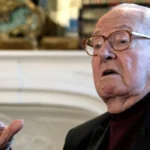There is currently “no consensus” in the European Union to send military instructors to Ukrainian soil, the head of European diplomacy said Tuesday in Brussels following a council of ministers. of EU Defense.
A debate has begun on this possibility, “but there is currently no clear common position on this subject”, declared Josep Borrell during a press conference after the meeting.
French President Emmanuel Macron created controversy at the end of February by saying that sending Western troops to Ukrainian soil should not “be ruled out” in the future.
Most European countries, as well as the United States, had clearly stood out, but some countries, such as the Czech Republic, have since taken a step in its direction.
Many European countries fear an escalation of the conflict in which NATO would then be involved.
On Monday, kyiv announced that French instructors were going to go to Ukraine “soon” to train Ukrainian troops, before backpedaling and indicating that they were still “in discussions with France and other countries on this issue.”
The French Ministry of Defense limited itself to mentioning “a project” in progress, without confirming the sending of French instructors to Ukraine.
Questioned on the subject on Tuesday, Russian President Vladimir Putin assured that these instructors were “already there”, in Ukraine, “under the guise of mercenaries”.
NATO Secretary General Jens Stoltenberg, for his part, recalled on Tuesday, before the start of the meeting of defense ministers, that there was no question for the Atlantic Alliance of sending soldiers to fight in Ukraine.
“We have no plans to send NATO combat troops to Ukraine,” he told the press, without closing the door to the possible sending of military instructors.
Some 50,000 Ukrainian soldiers have already been trained thanks to a program financed by the European Union, and 10,000 more could be trained before the end of the year, Mr. Borrell said.
For Estonian Defense Minister Hanno Pevkur, at least 100,000 are needed, according to a press release from his ministry.
This article is originally published on lorientlejour.com






